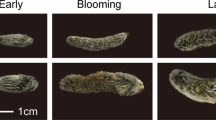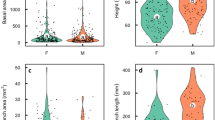Abstract
THE flowers of the Epacridaceae have been described as hermaphrodite1,2 or hermaphrodite, rarely dioecious3, but in the latter case no examples of dioecy are quoted. The following notes concerning species previously described as hermaphrodite indicate that unisexual flowers may be not uncommon in this family.
This is a preview of subscription content, access via your institution
Access options
Subscribe to this journal
Receive 51 print issues and online access
$199.00 per year
only $3.90 per issue
Buy this article
- Purchase on Springer Link
- Instant access to full article PDF
Prices may be subject to local taxes which are calculated during checkout
Similar content being viewed by others
References
Engler, A., and Prantl, K., “Die Natürlichen Pflanzenfamilien” 4, Part 1 (1897).
Rendle, A. B., “The Classification of Flowering Plants”, 2 (1952).
Hutchinson, J., “The Families of Flowering Plants”, 1 (1926).
Cheeseman, T. F., “Illustrations of the New Zealand Flora” (1914).
Hooker, J. D., “Handbook of the New Zealand Flora” (1867).
Skottsberg, K., Med. Göteborgo Bot. Trädgärd., 15, 423 (1944).
Darwin, C., “The Different Forms of Flowers, etc.” (1877).
Thomson, G. M., Trans. N.Z. Inst., 13, 241 (1880).
Author information
Authors and Affiliations
Rights and permissions
About this article
Cite this article
GODLEY, E. Unisexual Flowers in the Ericales. Nature 180, 284–285 (1957). https://doi.org/10.1038/180284b0
Issue Date:
DOI: https://doi.org/10.1038/180284b0
Comments
By submitting a comment you agree to abide by our Terms and Community Guidelines. If you find something abusive or that does not comply with our terms or guidelines please flag it as inappropriate.



